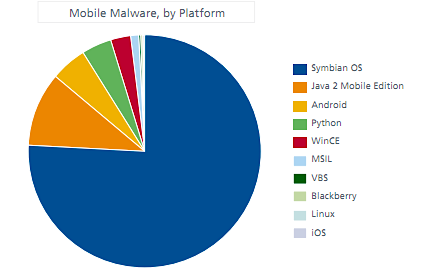'Mobile malware is the new frontier of cybercrime'

That's the stunning statement made by Robert Siciliano, a security and identity theft consultant, blogging for McAfee today. The post's title is nearly as provocative: "McAfee Reports Most Malware Ever in Early 2011".
Siciliano writes based on the McAfee Threats Report: First Quarter 2011, which released on June 1 and has gotten modest coverage among bloggers and journalists.
No, wait. He doesn't write based on the report at all. The blog post is actually a rewrite of McAfee's June 1 press release, literally lifted word for word. Can you say copy and paste?
Sampling of sentences word for word the same in the blog post and press release:
1. "Mobile malware is the new frontier of cybercrime".
2. "Malware no longer affects just PCs. As Android devices have grown in popularity, the platform has solidified its position as the second most popular environment for mobile malware, behind Symbian OS, during the first three months of the year".
3. "Cybercriminals often disguise malicious content by using popular 'lures' to trick unsuspecting users".
That's just a small sampling. But you get the point.
Who writes this stuff? Some PR wonk, or Siciliano lifting from the press release? Answer to either question is someone somewhere here being disingenuous. It's too bad, because the report is chock full of good data.
The point: There's too much public relations and not enough credible, original reporting on the web.
Last week, the New York Times rapped popular tech columnist David Pogue's knuckles for soliciting public relation pitches in presentation "Pitch Me, Baby". Arthur Brisbane, a Times editor writes:
Journalists are accustomed to seeing public relations pitches in their inbox. I was surprised, though, when I recently got one on June 8 touting tech columnist David Pogue's speech to PR professionals in which he credits PR with providing most of his ideas.
Say what? Most of his ideas?
Times readers deserve to be assured that journalists don't get too cozy with the PR professionals who strive to influence coverage. A virtual army of publicists, media specialists and others stands ready every day to infiltrate the news with stories that help their employers.
Pogue doesn't work for the Times; he's a freelancer. Apparently, he has promised not to do any more PR speaking engagements. If Pogue wrote for me, I'd cancel his contract, regardless of how popular a writer he is.
I don't see a whole lot of difference between Siciliano's post and Pogue writing stuff based on PR pitches. It's PR influence either way.
And you thought this post was going to be about mobile malware. So did I until observing those exact same sentences in today's McAfee blog post supposedly written by a third-party consultant lifted from the aforementioned press release.
Looked at differently, the malware here isn't the latest PC virus or Trojan but the PR infection in the stuff you read online. Well, maybe this post is about malware after all -- a public relations Trojan. BTW, I threw in the McAfee chart because the security report looks credible, even if the writing about it is suspect all to hell.
